About Mr. C. Leo Jordan
If I have found grace
And of me it is said,
"He abhorred the lie but embraced truth
And all loveliness;
Now, therefore, he has found immortal youth
And blessedness,"
I shall be forever grateful.
taken from his poem "The Prayer"
1925-2000
A friend once said about Leo, "He searched for the truth no matter where it led him and he had a blind trust in God." That aptly describes Leo Jordan.
C.Leo Jordan, retired instructor of computer sciences at Elizabethtown Community College in Elizabethtown KY, passed away on July 30th, 2000 at Sunrise Manor Nursing Home in Hodgenville KY at age 75.
After serving in the US Navy during WW II, he went on to graduate from both Ball State and Purdue Universities in Indiana. During his life he held the position of mathematician and physicist at The Tennessee Eastman Co. in Kingsport, TN and Univac Corp, in Bristol, TN and finally a computer science instructor at Elizabethtown Community College in KY.
The most important aspect of his life, however was his diligent study of the Bible. His studies prompted him to author several manuscripts which have circulated worldwide.
Eventually He followed in his father's footsteps to pastor a small church in Boston, Kentucky for 17 years.
Mr. Jordan had many hobbies and passions at which he excelled: woodworking, photography, art, poetry, music, and simply being humorous. He touched many lives not the least of which were his wife and four daughters.
We will greatly miss Leo, but we are confident that his search for truth has led him home.
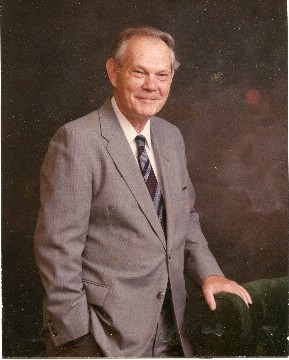
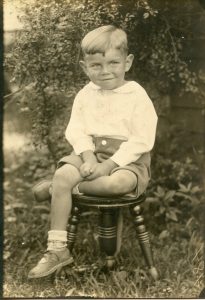
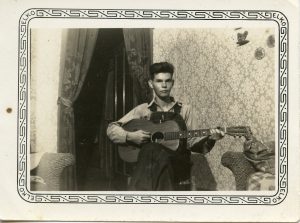
Early Years
Christopher Leo Jordan was born on June 11, 1925 in Shelbyville, Indiana in an apartment above a Pentecostal church. His parents Bruce and Alma Jordan had recently been converted to the faith while attending a camp meeting conducted by group of Pentecostals. Mr. Jordan was named after one of the saints there, Leo Sipes, who had helped the family in a time of need.
After the Great Depression hit, Leo's family moved to a farm in Carthage Indiana where his father worked as a hired hand. This was the year 1932. They remained on the farm until 1942.
Leo had a happy Indiana boyhood, enjoying the country life even though they were very poor. He was an excellent student and thoroughly enjoyed school. Leo was encouraged to skip the eight grade, which he did, (but always regretted it, having left his original classmates).
The family continued attending the Pentecostal church. Bruce Jordan had been "called" into the ministry, but had not taken a formal position, being content to study and learn over the next several years. Here is how Leo describes the typical church service of that day:
"The first thing I recall was the singing: the people sang as loud and as fast as they could. The songs were mostly unrecognizable; later, I discovered they were typical southern gospel songs. The song service was usually followed by prayer, then a “pop corn” testimony meeting, where people stood at their seats and gave testimonies of healing or salvation, or even a sermonette, all in a loud and excited manner. Several would be standing at once, and the leader would point to them in turn, while others would jump up to wait their turn. Hence, the term “pop corn.” After prayer, the evangelist, John Frank Wilson, got up to preach. He was a young man, about 17 or 18, very thin, and a regular jumping jack. When anyone said anything that tickled his fancy, he would jump out of his seat, clearing at least three feet, and yell “Halleluyer” in his southwestern Tennessee accent. His preaching was more of the same, all fire and fury, with many interjections of “Halleluyer,” or “Praise God,” or “Amen,” or “Thank you, Jesus.”
"The people believed that one couldn’t worship God unless it was at top speed and loud. All songs were sung entirely too fast, with no attempt on anyone’s part to sing harmony. The instrumentalists were not very skillful; guitarists pounded their instruments as hard as possible to get enough volume to be heard over the singing, a technique which broke strings frequently (this was before electronic amplification was available). Testimonies were the same way, loud and fast, lots of arm swinging and foot stomping. If everything went according to plan, the whole congregation would break out into shouting and dancing in the aisles. I have seen mature women, with their hair wound up in a bun on top of their head, run around the church, screaming at the top of their voice, until their hair jostled loose and fell over their shoulders, flying in the breeze. I have seen young ladies in their teens dance seductively for several minutes to the beat of the music. Invariably, someone would begin speaking in tongues, then there would be another, sometimes as many as three or four, all going at once. I have seen just about any acrobatic maneuver possible with one exception: though Pentecostals have often been labeled with the epithet “holy rollers,” I never saw anyone roll on the floor. I understand there was a sect in the nineteenth century whose members actually did lay down in the aisles and roll, which gave rise to the phrase, but I have never seen it in Pentecostal circles."
Leo's upbringing was steeped in religious fervor and fanaticism . . . and faith. His father was diligent in paying tithes, on crops, etc. There were incidents where Bruce Jordan would pay tithes on say, a crop of potatoes. The landowner's potatoes from the same crop would rot, but Mr. Jordan's would stay nice all year. Similarly, the cherries that the Jordan's canned would stay sealed, but the landowner's would spoil. One winter after paying tithes on the best of the crops, rabbits would come live under their porch (it was a mystery why they came to be there). The Jordan's had meat all winter!
Leo only attended church out of duty, like most children. Then sometime in his teens an incident happened:
"I cared nothing about the church services. One night, however, as I sat gazing out the window while she [the pastor] spoke, some mysterious force impelled me to turn around and look at her. I began listening. (Even though he knew every sermon by heart!) Soon, the most remarkable thing that ever took place in my life happened: I began crying. Imagine me — a macho kid who prided himself on never shedding a tear — weeping and spilling out a torrent of tears! As I write this, I can hardly believe it really happened. I definitely felt the Lord’s Spirit urging me to repentance; every word she spoke was meant for me and went like an arrow to my heart. The best description is found in Psalm 45:5, “Thine arrows are sharp in the heart of the king’s enemies; whereby the people fall under thee.” Ray and his brother Robert came back to talk with me and to urge me to go to the altar to pray. I didn’t go at that time; I was too embarrassed. However, before the summer was over, I had Dad baptize me in White River. Then, nothing for another three years. I felt nothing and did nothing towards my salvation. "
The Jordans lived on the farm a year or two longer than necessary for two reasons. Bruce Jordan had promised to stay until Leo graduated from high school in Carthage. The other reason illustrates the strong faith and character of Bruce:
"However, he [Bruce Jordan] had another opportunity to leave the farm about four years previously. Uncle Watt Carpenter offered Dad a job as his assistant, paying him twice as much and teaching him more about carpentry. We all begged Dad to take it, for we knew he liked the work and was good at it. We went so far as to locate another house which would still permit me to attend Carthage school. I don’t know whether Dad actually paid any rent on it or not, but we thought it was a sure thing. Then he backed out. Mom cried a long time. I felt sorry for all of us. Many years later, Dad told us why he didn’t accept the opportunity. He said he would enjoy the work so much and possibly get so prosperous and independent that he would be tempted to leave the ministry. To prevent that, he stayed where he was, knowing the day would come when he would have a pastorate and be free".
Christian Testimony
Mr. Leo Jordan was reared in a very strict Christian home in a branch of Pentecostalism known as The Oneness Pentecostal Holiness Church. Having attending meetings all his life, and with his father being "called" into the ministry, Leo was fully indoctrinated. At age 17 Leo had an experience with God that compelled him to get baptized. He did not, however, make anymore strides towards his Christian growth. He was inducted in the armed forces during World War II and there he still lived a good moral life, even sharing his faith with others. After his military service was up, Leo married Evelyn Motsinger, whom he met when she was visiting his church in Medora Indiana. Leo then went to college and university on the GI Bill, and excelled in mathematics. In 1957 he was offered an excellent position in the (then) new field of computer programming at Sperry Farragut, located in Bristol Tennessee. Leo moved his wife and his two daughters to East Tennessee. (Two more daughters were born in Tennessee). Leo scouted out the area ahead of time and chose a location near a Pentecostal church. (He could have chosen a more prestigious area, but wanted to be near a church of his faith).
This is where the story turns to Leo's faith being injured and almost destroyed. It seems that time after time Leo caught the pastor in a lie or a blatant scheme to make money or something to get himself an advantage.
"I finally quit attending as often as services were held. But my conscience rebuked me for being so uninterested in “salvation,” and I told Evelyn one Wednesday evening," Look, sweetheart, I’ll go this one time. Based on what I hear, I will either continue to attend faithfully, or I will quit entirely.
That evening, he began teaching something, I have forgotten what, that was quite good. I just sighed and relaxed, when he interrupted his thinking after only about five minutes, pointed at some teenage girls on the back row, and said, “OK, you gals think you have old Bro. P___ fooled, don’t you? I know you have got natural fingernail polish on your fingers — you’re not fooling me. etc. etc. blah, blah, blah,” and that did it. I promised myself to never attend his church again.
I kept that promise for over ten years. Not only did I quit his church, but I refused to go to any church. I was totally disillusioned with Pentecost, and, by extension, any church. My thinking was that if that is the best the Holy Spirit can do, then I don’t know whether there be any such thing as the Holy Spirit.
Little by little I extricated myself out of their [the Pentecostals'] propaganda, but at the price of becoming, almost, an unbeliever in Christ himself. It would be more than ten years before I set foot inside a church again
I felt free as a bird after I left off church attendance. But what I want to tell you, dear reader, is how the Lord worked in my life to save me from myself."
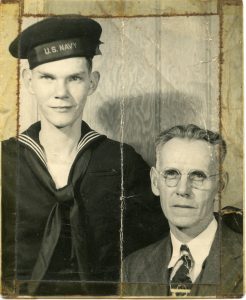
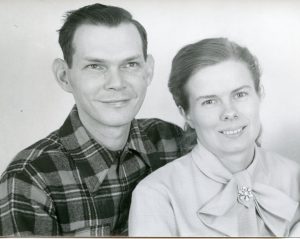
Continued
"It all began with my job. I was considered the best computer programmer and systems expert in East Tennessee at this time. I was always sought out for the toughest and the most difficult assignments. "
Leo's job was very rewarding, where he worked with some of the brightest engineers on some very interesting projects. His employment at Sperry, however, did not last long, as a contract with the government was not renewed, and Leo went to work as a physicist for The Tennessee Eastman Co., in Kingsport Tennessee.
Again, the job was very rewarding and Leo excelled in every project given him to complete. But because of plant politics and the jealously of supervisors, Leo was fired from his job. Still, he bounced back and found employment again at Sperry, who now had a long-term contract with the government. He was hired as a mathematician to work on the Pershing missile. Leo was overjoyed.
Alas, things turned sour again. Sperry got bought out by Univac and with that came changes. Leo and some other engineers were sent to St Paul, MN to a computer conference.
I was ordered to go to St. Paul, Minnesota, to a computer conference. While there, we engineers decided to go out one evening to a hot-spot to eat and watch the entertainment, which the others assured me was nothing but the best. I went, somewhat skeptical of the whole thing and was not disappointed in that respect, either. The food was terrible; the only way it could be considered adequate was by being half drunk. Which most of the engineers were. They gulped down their liquor and flirted with the waitresses something awful, even to getting dates with them. I thought it was scandalous. Then the “entertainment” began. It was a jazz trio consisting of an accordion, a trumpet, and a guitar, played by two men and a woman. Their “act” was based on a homosexual plot. It was totally sickening to me. I made a promise right there on the spot to the Lord: I said, Lord, if you let me get home safely, I will return to you and repent of my sins, if you will accept me back.
That is exactly what happened. But first, I must tell you about another small but significant incident that took place there in St. Paul. I was rooming next to Al Price, one of the systems analysts at Sperry. He had told me previously that he had an identical twin brother who was studying for the ministry in a Church of Christ seminary in Louisville, Kentucky. He also asked me about tongues. I told him what I knew about the phenomenon, and he said his brother had spoken in tongues, exactly like on the day of Pentecost! Coming from a Church of Christ disciple, I could hardly believe that! They have always been bitter opponents of the Pentecostal experience.
On this particular evening, Al was in my room talking. He asked me a theological question. I answered him with a note of skepticism. He grew angry and said, as he left the room, "Just because you don’t have any faith, you are taking mine away."
To which I replied, “If you truly had faith, nothing I could say or do would take it from you.”
As soon as he left the room, a stern thought crossed my mind: “What do you mean arguing on that side of the question for? Why don’t you spend your energy fighting for me and righteousness instead of our enemy?” which I knew was directly from the Lord himself.
That really floored me. I began shedding tears. Quickly, I saw a Bible placed on the night stand by the Gideons, ran over to it, picked it up, opened it at random, and read, The vile person shall be no more called liberal, nor the churl said to be bountiful”(Isa. 32:6).
Oh, I said, if that could only be so. What a lovely and beautiful kingdom Isaiah has painted out for us in this chapter, for a bit further on, he also says,
Then judgment shall dwell in the wilderness, and righteousness remain in the fruitful field. And the work of righteousness shall be peace; and the effect of righteousness quietness and assurance forever (Isa 32:16-17).
I was stunned! Quietness and assurance forever! That was me all over; if ever anyone ever appreciated “quietness and assurance” it was me. I began to cry out to God right there on the spot to save me from destruction and to give me a place, even if only a small one, in the blessed kingdom he was preparing for his people. There began a long conversation with the Lord, though it took place completely within my mind. I pleaded all sorts of objections to living a righteous life. The Holy Spirit just as quickly brought forth Scriptures to answer my objections. I may give out some of this conversation a bit later, as it was very important to me at that time. In fact, I consider it as a time I talked directly to and heard from the Lord himself. Many other times has this been repeated, but that was the first time in my life. I was overwhelmed. The Bible, as it was repeatedly brought to mind, contained the answers to each and every one of my objections. One instance stands out: I was painfully aware at this time of the deficiencies in the logic of Pentecostal teachers: how they misread certain texts, had wrong definitions of words, had the cultural facts of the Jewish people wrong, how their science was woefully in error, etc. I felt that as a result, their interpretations of Scripture were dreadfully distorted and quite wrong. I said, with all of this in mind, “But Lord, these people are fools and I would be a fool to listen to them.” To which the Lord replied by bringing to mind what Paul said, “We are fools for Christ’s sake” (1 Cor. 4:10). I immediately saw the principle that no matter how intelligent we were, no matter how much we knew, in God’s eyes we are all fools. But the biggest fool is the one who loses his soul. The conversation ended when I gave up and asked the Lord “What should I do?” And he replied, “Get up and work for me and the kingdom. Quit being so lazy and shiftless. You are like a soldier who deserted his position at the front line, but who is complaining about losing the battle. So get back in there and fight for me.” I said, “Yes, Lord, as soon as I get back home, I will start.” This thought, perhaps the most profound of all, came into my mind at that time: the definition of faith. If I refused to believe that God did indeed intend to correct all the deficiencies of this world, it would not stop him. But it would stop me from enjoying it, for I would be forever lost into eternal darkness out of God’s presence. But if I had faith in God’s good intentions, I would be guaranteed a place in that supernal kingdom one day. Therefore, faith acts sort of like the creative element in itself; it can either destroy or create what we desire for our future. The whole essence of faith is, it must be held at a time when there is little or no evidence of its being effective. Then came to me what the author of the epistle to the Hebrews meant when he said, “Faith is the substance of things hoped for and the evidence of things not seen” (Heb. 11:1). The evidence of things not seen — that says it exactly. We do not see the kingdom of God yet — there is absolutely no evidence that man can ever live together in peace, with no diseases, epidemics, murders, frauds, droughts, famines, or any other hurtful or destructive element to hinder. Yet our faith gives this to us. It will one day be all true, just as we have now believed. I was then reminded of Job’s lot, how that he too wondered at the goodness of God, even so much as stating that he, Job, knew more about justice than his Creator did. But God asked him a few natural science questions which Job couldn’t answer. God more or less said, “If you, Job, cannot answer even the simplest of these questions concerning the providence of God, but you admit that God did create the whole universe, how can you be so much wiser than God on matters of conscience, faith, and righteousness? I, almighty God, can both create a perfect universe, and I have a desire to do so; please, then, show me how you also believe in me that I will, and you can be a partaker of the goodness that shall be revealed.”
As soon as I got home (which was quite late in the evening), I called Evelyn’s pastor, Rev. Tom Marshall, and asked him if it was too late for him to come over. He and his wife both came over to talk for a spell. Their love and concern was one of the most rewarding things I have ever witnessed; I all but promised I would start going to church at their place, which was where Evelyn attended church.
The next day at work, I went about my business as usual. We were making plans for the Thanksgiving holiday the following week. I, as the programming supervisor, gave all my programmers the holiday off. When my boss found out about it, he had a fit; he called me in to his office about noon, and asked me who I was having in to work. When I said no one, he grew very angry and made me change that. So I called over one of the programmers, Ed Burch, and asked him if he minded working over the holidays. He said that he had other plans, but if that is what I wanted, he would work. That seemed to gratify my boss somewhat; however, I asked, “Jim, how was I to know you wanted us to work? I remember that you told everyone we were on schedule in converting over to the new computer and would not need to work on the holidays; we would take all holidays off.”
“Yeah, I said that, but I lied. I just wanted to get them off my back. We have to work all holidays just to catch up.”
Then he took me to task, and, for over an hour and a half, he mercilessly bawled me out; what so surprised me was that we had never until this moment had a disagreement on any topic. I had even bragged about having a really good and understanding boss. The only thing, however, I remember him saying was this: “Leo, you must put your job and your work first; your family second, and anything else, third place, if you want to succeed.” How did he know I was just in the process of putting God first in my life again? That truly bothered me. After an hour and a half of his talking and bawling me out, he let me go. I was devastated. I couldn’t go eat, for I was too nauseous. Along about 3:00 PM, with just an hour before quitting time, a thought crossed my mind as loud as a shout; “Leo, don’t you know the voice of Satan when you hear it? He is afraid you are about to get off his hook and is trying to scare you back into his clutches again.”
That really cleared the air. I went home actually whistling for joy. I went straight into the bedroom where Evelyn was working on something, knelt down at her side, and confessed I had been wrong about church and about the Lord. I said, “If he will accept me back, I will straighten up and live the right kind of life.”
On Sunday evening a week after Thanksgiving, when altar call was given, I walked the longest 30 feet I ever walked in my life down to the altar, laid down my head on it, and cried and pled with God. After a few minutes, I said,
“Lord, I’ll do anything you ask me to do, even preach, if that is what you want.” I had run from accepting the call of being a minister all my life. I had no use for Christian preachers, none whatsoever, even though, or maybe because, I knew so many. Here I was making a voluntary offer to accept such a reviled position! My refusal to consider the ministry must have been one of the rebellious acts I had succumbed to, for no sooner had I thus spoken when I began to speak in other tongues. I felt absolutely refreshed, forgiven, and innocent for the first time in my life. I got up and looked upon the people standing around me, seeing Christian love in their eyes, and I felt that I truly loved them, the first time ever! Then the Scripture came to me,
We know that we have passed from death unto life, because we love the brethren. He that loveth not his brother abideth in death (1 John 3:14).
I never slept in my life as well as I did that night. I was healed, saved, and justified, all for the asking! Truly God is good; all it takes to get in on that goodness is a willing heart!
Shortly thereafter, (1972) Leo was again fired from his job. This time, however, he recognized the hand of the Lord, removing him from situations to get him where God wanted him. Leo started earnestly studying the scriptures. It came about in this manner:
"I never liked Sunday School and so I refused to attend for the first few weeks after my restoration. Evelyn, however, faithfully attended. One Sunday morning while she was gone to Sunday School, I was reading the Bible and praying. All of a sudden, I was impelled to look up at the ceiling. I thought that Jesus had descended to just above the ceiling out of sight and was sitting on a throne; but what was so amazing to me was that my mental image of him was exactly like that of a Jewish rabbi. In fact the thought crashed through my consciousness that Jesus was indeed the greatest rabbi Israel has ever had. This mental image of Jesus placed in my mind the thought that I had better study the Scriptures; it was my life. And he would teach me through his Spirit what the Scriptures meant.
After a few minutes, the near-vision vanished. I was totally broken up."
As a result, Leo studied the scriptures with fervor from that day on. In the beginning he was zealous to provide support for the belief system of his particular church, the school of thought called dispensationalism. Try as he might, the scriptures would not support that doctrine but lead him in another direction. The writings contained on this web site are a result of his studies. At the time, Leo thought he was alone, with only a handful of people who corresponded with him in agreement. But had the internet been available at that time, he would have quickly realized that countless others, in present day and throughout church history have had similar theological ideas.
An interesting aside is that during those 10 years that Leo considered himself an agnostic, his wife Evelyn and his parents Alma and Bruce Jordan continued to pray for his faith to be restored. Shortly before Leo lost his job at Sperry, Bruce Jordan had prayed specifically, for God to allow Leo to lose his job if that is what it would take to save his soul.
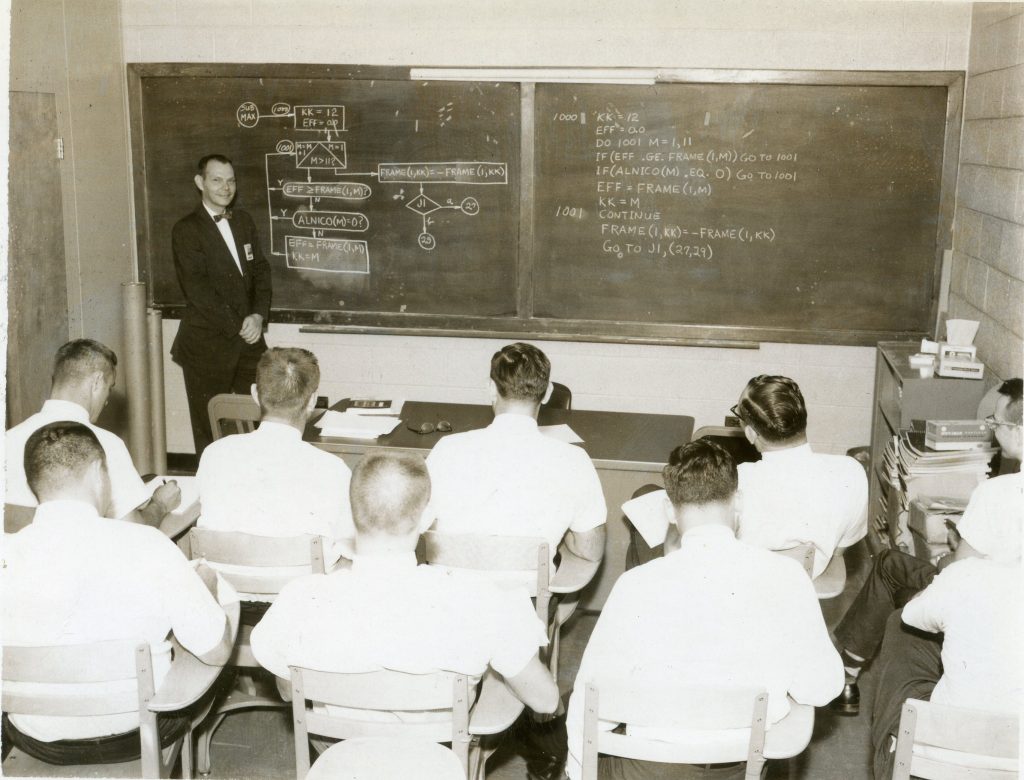
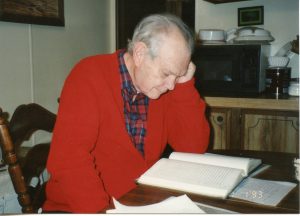
Later Years
After being fired from Sperry (Univac) Leo traveled around holding bible studies at various places for the next few months. Finally he got a job at Tri-Cities Vocational Technical school teaching computer science. This was around 1973. Then in 1978, Leo's father passed away in Boston, Kentucky. The parishioners of the little church where Bruce Jordan was pastor, voted for Leo to be their new pastor. After much thought and prayer, Leo accepted the position. He and Evelyn, and the last daughter still remaining at home, moved from Kingsport, TN to Boston, KY. Leo eventually took a part-time position at the local community college in Elizabethtown, KY teaching computer science. He had to take an early retirement due to his becoming deaf but remained pastor of the Temple Hill Church in Boston until he had a major stroke in 1993, shortly after he had finished writing his autobiography (which has been extensively quoted on this web site).
Here is the next to last paragraph in his autobiography:
In spite of my failing health, I am happier than at any other time in my adult life. I feel far more secure in my salvation than ever before, and that in the face of my having severed all official connections with the Pentecostal church. I do not belong to any official or even unofficial organization, but prefer to strike out alone — except with the sure help of Jesus Christ. And he has given me plenty of help. It would be boring to go into details, but on plenty of occasions, the Lord has come to my aid. Sometimes, it is to correct me for wrong actions; this is an important part of one’s Christian life, but one that is often neglected. At other times, the Lord has intervened on my behalf, encouraging me to fight the Christian battle against sin and temptation even more valiantly than I ever have before. Now that I am retired from all work, I have the time, if not the energy, to write and study God’s word. It has been a most profitable time of life. (Written at age 67, in 1992).
Leo lived the last five years of his life in Sunrise Manor Nursing Home, where he passed away in 2000. While a resident at the nursing home, Leo continued to tell people about Jesus.